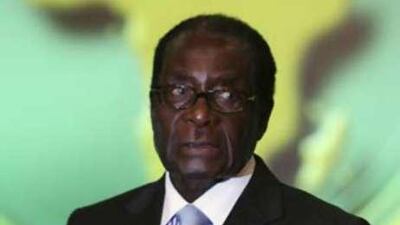African leaders resumed talks on how to deal with Robert Mugabe, the Zimbabwean president, today as the US prepared UN sanctions over his one-man election that much of the world has dismissed as a farce. The 53-member African Union was holding closed door talks on the final day of a summit in Egypt amid intensifying pressure for for the continent's leaders to act to resolve the crisis which some fear could destabilise southern Africa.
Ban Ki-moon, the UN Secretary General, pledged to work to broker a solution, repeating his view that the violence-marred election that gave veteran leader Mr Mugabe another term lacked legitimacy. Zimbabweans should be able to "enjoy genuine freedom" so they can "choose their leaders out of their own will without being intimidated," Mr Ban said. "You have my full commitment that I will spare no efforts to work out a solution."
Mr Ban cited the example of Kenya, where former UN chief Kofi Annan brokered a power-sharing deal that ended weeks of bloodshed after a disputed election in December. "The situation in Zimbabwe has great implications not only to the people and government in Zimbabwe," Mr Ban said, calling it "important to maintain the credibility of democratic rule in Africa as a whole." Some African leaders have demanded tough action against Mr Mugabe. Raila Odinga, the Kenyan prime minister called for his suspension from the African Union until he allows a free and fair election.
But the continent's longest serving head of state, Omar Bongo, the Gabonese president, insisted that African leaders should accept Mr Mugabe's poll victory. "He was elected, he took an oath, and he is here with us, so he is president and we cannot ask him more," Mr Bongo told reporters yesterday. Mr Mugabe, 84, was sworn in for a sixth term after being declared the winner of Friday's election run-off with more than 85 per cent of the vote in a race boycotted by opposition candidate Morgan Tsvangirai because of deadly violence and voter intimidation.
Washington announced that it was preparing to present a draft sanctions resolution to the UN Security Council and urged African leaders to listen to their own election observers, warning the pan-African bloc's credibility was at stake. "The vote fell short of the African Union's standards of democratic elections," the AU observers said in a statement issued in Harare yesterday. Zalmay Khalilzad, the US ambassador to the United Nations said he was preparing to circulate a draft sanctions resolution among Security Council members and was "cautiously optimistic" it would be approved.
"The United States is consulting with others to introduce a resolution perhaps this week to impose focused sanctions on the regime," he said. Tom Casey, the US State Department spokesman said the sanctions should impress upon Harare's neighbours the need for urgent action at the regional level. "We think that it is important that the African Union signal that a sham inauguration that was preceded by a sham election does not make the government legitimate," Mr Casey said yesterday.
"We would certainly expect that the AU would call for a halt to the violence, a halt to this process and for Mr Mugabe and others in his regime to engage some discussions with the AU, SADC (the 14-nation Southern African Development Community) and the UN to help achieve a political solution to the situation," the spokesman said. Without making any reference to the United States, AU Peace and Security Commissioner Ramtane Lamamra said on Monday that "sanctions are not the best tool that modern diplomacy has at its disposal."
With no consensus among the AU's 53 member states on tough action against Mr Mugabe, the bloc has focussed its efforts on pushing for a power-sharing arrangement between his ZANU-PF party and Mr Tsvangirai's Movement for Democratic Change. *AFP

